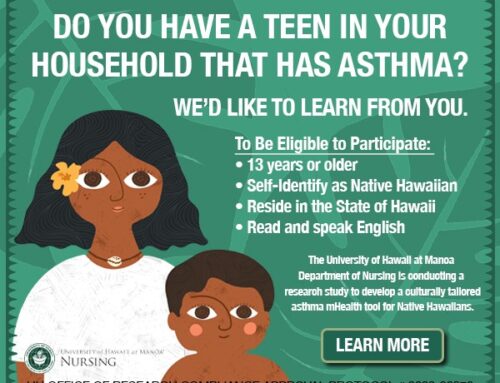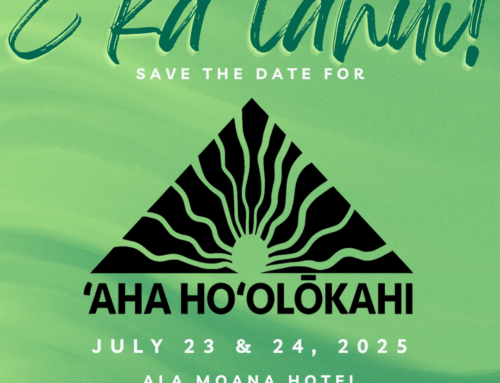
December is HIV/AIDS Awareness month. It’s a reminder that tremendous strides have been made, yet there is still much more to be done to end the epidemic. There are actions, supported by Hawaiian values, that we can take every month to monitor our HIV status and partake in activities that strengthen our bodies as well as our relationships with our ʻohana and community members who are living with HIV and AIDS.
OLAKINO MAIKAʻI (maintaining a healthy person). This month we bring you up-to-date information about HIV/AIDS and advancements in medication. We will emphasize the importance of open dialogue, testing regularly, and promoting a healthy body.
HOʻOMANAʻO (remember, learn from the past). December is a month of both remembrance and acknowledgement of how far we’ve come in testing, prevention and treatment of HIV and AIDS. Acquired Immunodeficiency Syndrome (AIDS) and Human Immunodeficiency Virus (HIV) has been among us for nearly 40 years. It is fortunate that new, breakthrough treatments have have provided the opportunity, regardless of diagnosis, to enjoy greater longevity and mauli ola (healing). Although HIV and AIDS are no longer considered deadly, the stigma around diagnosis, education and treatment remains.
‘IMI ‘IKE (to seek knowledge). Available data and resources enables us to make more informed decisions, so we can be makaʻala (vigilant) around our own lives and mālama (protect/care for) our partners, ʻohana and community.
Looking at newly diagnosed rates by age, the Hawaiʻi State Department of Health reported in 2020 that the highest rates ranged between the age group of 20 – 29 years.
Mālama kekahi i kekahi. To be proactive, if you fall within this age range, get tested, know your status, and consider other methods to protect yourself and others. These include talking to your PCP about PrEP, as well as using condoms. If you are outside the 20-29 age group, you can still practice harm reduction techniques and talk openly with those within your family and friend circles, however awkward.
The Centers for Disease Control and Prevention has an initiative to end the HIV epidemic (EHE) in the United States. The Hawaii State Department of Health Surveillance report identified 50 cumulative positive cases in 2020, which is a gradual annual decrease since 2016. We are on a downward trajectory toward achieving the EHE campaign but it is still our kūleana (responsibility) to continue that stride and mālama one another. We can learn from each other, for each other.
HIV Undetectable = Untransmittable (U=U) is achieved by using Antiretroviral therapy (ART). Though ART does not cure HIV, it does help suppress the viral load and can work effectively to prevent transmission by 96% according to World Health Organization. At a 2018 AIDS Conference, during a presentation on a study on condomless sex, there were no HIV transmissions among almost 77,000 condomless sex acts where the HIV-infected partner had an undetectable viral load. Research and advance medicine also introduced pre-exposure prophylaxis (PrEP) and post-exposure prophylaxis (PEP) to prevent further transmission for those uncertain if they may have been exposed. If you’re considering taking PrEP, you must be HIV-negative prior to starting and test regularly. For any of these therapies to be of any use, it is vital that the medications are taken early and as prescribed by your PCP.
NA‘AU PONO (nurturing what is right or just). The safest measure is to know how HIV/AIDS can be transmitted in order to prevent it. HIV can be spread from an infected person through blood fluids, rectal fluids, and breast milk. Having unprotected sex or sharing needles and syringes are some risky behaviors of those who have tested positive. Testing regularly as part of your routine health care practice is important for prevention of HIV infections that applies to everyone. CDC notes that nearly 40% of new HIV infections are transmitted by people who don’t know they are infected. Doing what you can as part of your kuleana (responsibility) protects your health.
If you or anyone have questions or in need of services in Hawai’i, the Hawai’i State Department of Health has a list of agencies throughout the state listed below. They provide a safe space for further resources, testing services, and support.
- Hawai’i (East) Kumukahi Health & Wellness
Hilo Lagoon Center, 101 Aupuni Street, Penthouse 1014C, Hilo, HI 96720 – (808) 982-8800 - Hawai’i (West) Kumukahi Health + Wellness
Palani court, 74-5620 Palani Road, Ste 101, Kailua-Kona, HI 96740 – 808) 331-8177 - Kaua’i – Malama-Pono Health Services
4370 Kukui Grove Street, Suite 115, Lihue, HI, 96766 – (808) 246-9577 - Maui County – Maui AIDS Foundation
1935 Main Street, Suite 101 Wailuku, HI 96793 – (808) 242-4900 - O’ahu – Hawai’i Health and Harm Reduction Center
677 Ala Moana Blvd Suite 226, Honolulu, HI 96813 – (808) 521-2437
We are strengthened by our ala kūkui (guiding principles) to support our ‘ohana with HIV/AIDS and our kuleana (responsibility) to protect one another.


